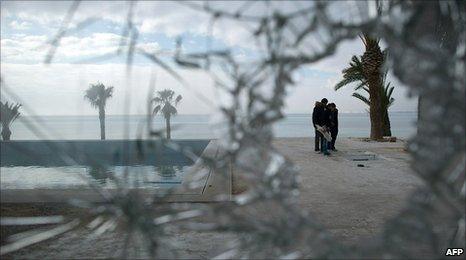Tracking down the Ben Ali and Trabelsi fortune
- Published

While Zine al-Abidine Ben Ali's regime fell, Tunisians expressed their view of him by attacking property he and his extended family left behind.
No-one can say exactly how much Mr Ben Ali, his second wife Leila Trabelsi, and a sprawling network of relatives, had to their names.
But it was a financial empire that reached far and wide, and is now the subject of a multi-pronged international investigation.
"Our Tunisian lawyer friends tell us that the Ben Ali and Trabelsi families controlled between 30% and 40% of the Tunisian economy," said Daniel Lebegue, head of the French branch of Transparency International.
"So a simple calculation allows us to say we're looking at about $10bn (£6bn)."
"The number of assets held by relatives within these clans was significant in all sectors of the economy: banks, insurance, distribution, transport, tourism, property."
The families built this vast network, activists allege, by wielding the power of an authoritarian state.
Leila Trabelsi, a former hairdresser who married Mr Ben Ali five years after he came to power (but still commonly known by her maiden name), was seen as particularly effective at enriching relatives with lucrative holdings.
"They bled the country systematically," says Nicolas Beau, co-author of the Regent of Carthage, a book about Leila Trabelsi that has only appeared in Tunisian shops since she and her husband fled the country on 14 January.
"There was a climate of fear and terror, so when people from the clan required Tunisians to give up their houses or land, they normally obeyed."
Frozen yoghurt
Popular loathing had a lot to do with the fact that their names were synonymous with intimidation and corruption.
In one of the diplomatic cables published late last year by Wikileaks, a former US ambassador detailed how Mr Ben Ali's family was widely viewed as a "quasi-mafia", and the "nexus of Tunisian corruption".
The way they flaunted their fortunes - another source of resentment - is described in colourful terms in another cable.
The ambassador writes about going to a dinner at the seafront home of one of the president's daughters, Nesrine, and her husband, Sakhr el-Materi, where frozen yoghurt was flown in from Saint Tropez, and a caged pet tiger was fed four chickens a day.
The wealth and ostentation at the top of the regime became particularly galling in the context of the financial and economic crisis of the last two years, analysts say.
Though Tunisia generally enjoyed steady economic growth under Mr Ben Ali, many - including the young men who launched the protests in December - remained poor.
During those protests, businesses and shops linked to the family were singled out.
Once Mr Ben Ali was toppled, cars imported by his son-in-law were smashed and demonstrators ransacked the family's opulent villas.
The former opposition - some of whom have been included in Tunisia's interim government - now want to recover ill-gotten gains.
Thirty-three Ben Ali or Trabelsi family members have been arrested and Tunisian authorities have requested the arrest of Mr Ben Ali and six other fugitives through the international police agency, Interpol.
The suspects are accused of illegally acquiring assets and transferring funds abroad during Mr Ben Ali's 23 years in power.
Mr Ben Ali himself is in Saudi Arabia, after reportedly being refused entry to France in mid-air as he fled Tunisia.
Leila Trabelsi's eldest brother Belhassen, believed to have been worth billions in his own right, is reported to be in Canada.
'Racehorses and cars'
Tunisian officials have said they intend to recover all of the ousted ruling family's assets within reach, while trying to protect employees working at affected companies.
But an unknown quantity of their wealth has been deposited or invested outside Tunisia, in countries including France, Switzerland, Argentina, and the United Arab Emirates.
Mr Lebegue of Transparency International said investigations by lawyers' associations, non-governmental organisations and journalists indicate that the families own a "significant amount of property" in Paris, on the Cote d'Azur and in the Alps, as well as other possessions held in France including racehorses and luxury cars.
There were even reports in the French media that Leila Trabelsi withdrew bars of gold from the central bank not long before leaving Tunisia.
Activists want international authorities to act fast to freeze the family's assets, though they are optimistic that there is now enough scrutiny in Europe to prevent funds being moved.
Swiss officials have frozen tens of millions of francs, and grounded a Falcon 9000 jet in Geneva.
French officials have been looking at similar measures.
Within Tunisia, Mr Beau said he did not think it would be hard to prove that holdings had been illegally acquired, due to a paper trail and to the sheer number of people involved in the family's business dealings.
"Despite the nature of the regime in Tunisia, a very strong tradition of regulation survived," he said. "Everything was legislated for, everything was written down.
"Everyone had to deal with it, there are an innumerable number of witnesses."